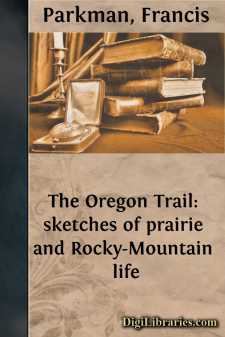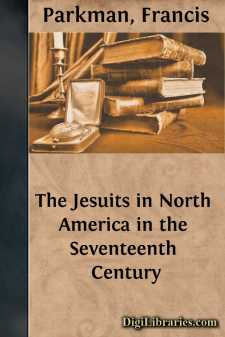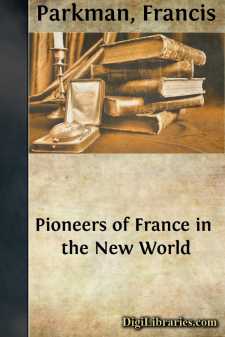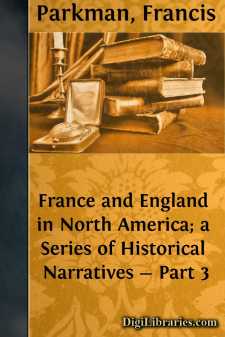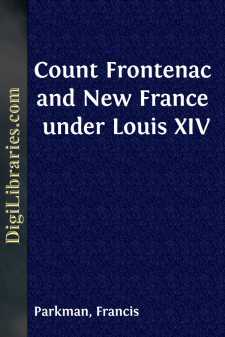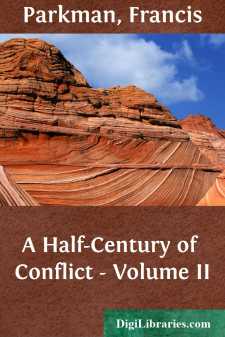Categories
- Antiques & Collectibles 13
- Architecture 36
- Art 48
- Bibles 22
- Biography & Autobiography 813
- Body, Mind & Spirit 142
- Business & Economics 28
- Children's Books 17
- Children's Fiction 14
- Computers 4
- Cooking 94
- Crafts & Hobbies 4
- Drama 346
- Education 46
- Family & Relationships 57
- Fiction 11829
- Games 19
- Gardening 17
- Health & Fitness 34
- History 1377
- House & Home 1
- Humor 147
- Juvenile Fiction 1873
- Juvenile Nonfiction 202
- Language Arts & Disciplines 88
- Law 16
- Literary Collections 686
- Literary Criticism 179
- Mathematics 13
- Medical 41
- Music 40
- Nature 179
- Non-Classifiable 1768
- Performing Arts 7
- Periodicals 1453
- Philosophy 64
- Photography 2
- Poetry 896
- Political Science 203
- Psychology 42
- Reference 154
- Religion 513
- Science 126
- Self-Help 84
- Social Science 81
- Sports & Recreation 34
- Study Aids 3
- Technology & Engineering 59
- Transportation 23
- Travel 463
- True Crime 29
Francis Parkman
Francis Parkman (1823-1893) was a prominent American historian best known for his extensive works on the French and English colonization of North America. His most acclaimed series, "France and England in North America," meticulously chronicles the colonial struggles between these two European powers, offering vivid narratives and detailed historical accounts. Despite facing significant health challenges, including partial blindness, Parkman's dedication to rigorous research and his engaging prose style have left a lasting impact on the field of American historical writing.
Author's Books:
Sort by:
by:
Francis Parkman
CHAPTER I THE FRONTIER Last spring, 1846, was a busy season in the City of St. Louis. Not only were emigrants from every part of the country preparing for the journey to Oregon and California, but an unusual number of traders were making ready their wagons and outfits for Santa Fe. Many of the emigrants, especially of those bound for California, were persons of wealth and standing. The hotels were...
more...
by:
Francis Parkman
Few passages of history are more striking than those which record the efforts of the earlier French Jesuits to convert the Indians. Full as they are of dramatic and philosophic interest, bearing strongly on the political destinies of America, and closely involved with the history of its native population, it is wonderful that they have been left so long in obscurity. While the infant colonies of...
more...
by:
Francis Parkman
INTRODUCTION. The springs of American civilization, unlike those of the elder world, lie revealed in the clear light of History. In appearance they are feeble; in reality, copious and full of force. Acting at the sources of life, instruments otherwise weak become mighty for good and evil, and men, lost elsewhere in the crowd, stand forth as agents of Destiny. In their toils, their sufferings, their...
more...
by:
Francis Parkman
PREFACE. The discovery of the "Great West," or the valleys of the Mississippi and the Lakes, is a portion of our history hitherto very obscure. Those magnificent regions were revealed to the world through a series of daring enterprises, of which the motives and even the incidents have been but partially and superficially known. The chief actor in them wrote much, but printed nothing; and the...
more...
by:
Francis Parkman
PREFACE. The events recounted in this book group themselves in the main about a single figure, that of Count Frontenac, the most remarkable man who ever represented the crown of France in the New World. From strangely unpromising beginnings, he grew with every emergency, and rose equal to every crisis. His whole career was one of conflict, sometimes petty and personal, sometimes of momentous...
more...
by:
Francis Parkman
The occupation by France of the lower Mississippi gave a strong impulse to the exploration of the West, by supplying a base for discovery, stimulating enterprise by the longing to find gold mines, open trade with New Mexico, and get a fast hold on the countries beyond the Mississippi in anticipation of Spain; and to these motives was soon added the hope of finding an overland way to the Pacific. It was...
more...


